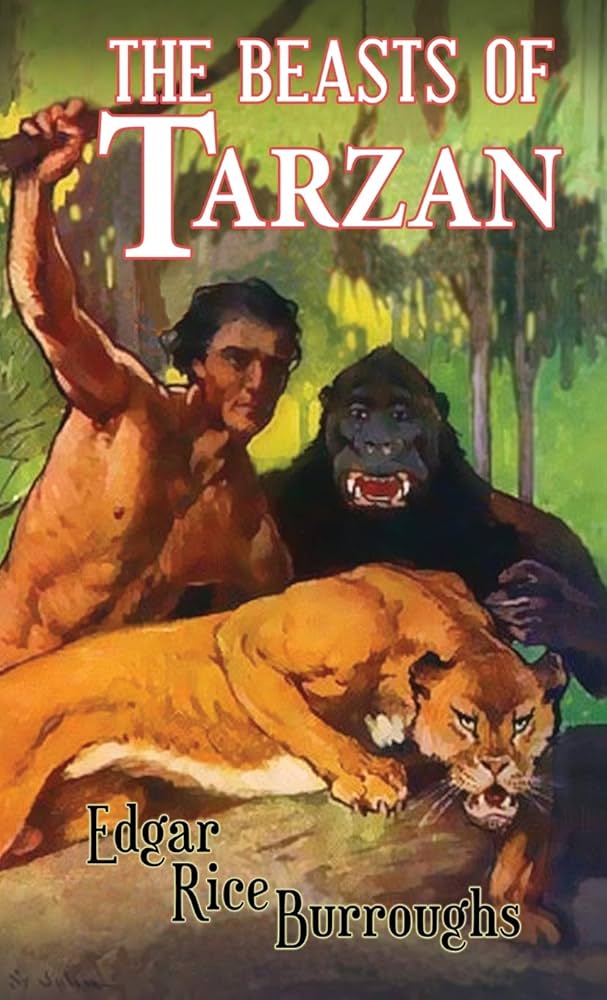Chapter 19 — The beasts of Tarzan
byChapter 19 – The beasts of Tarzan opens at dawn as preparations are made aboard the Kincaid for a return voyage that feels both urgent and uneasy. Tarzan, determined to reach Jungle Island and find his son, stands at the center of it all—quietly commanding, yet visibly driven by a father’s desperation. The ship’s crew, pardoned for past offenses, now works earnestly under his direction, driven less by loyalty and more by the relief of forgiveness. On deck, Sheeta and Akut’s apes are released, their animal instincts restrained only by Tarzan and Mugambi’s firm authority. These creatures, once enemies of men, now follow the law of Tarzan, a testament to his bond with the wild. Beneath this fragile peace lies the tension of unpredictability, as the fusion of man and beast aboard the ship mirrors the struggle between instinct and control.
As the African coast fades behind them, Tarzan experiences a quiet ache. Though his roots lie in the jungle, the urgency of reuniting with his child drowns out any sense of nostalgia. The ship glides through calm waters, but for Tarzan, every hour feels like a burden, stretched thin by worry and hope. Below deck, Paulvitch sits alone, separated from the crew by distrust and self-preservation. A soft, rhythmic ticking in his cabin goes unnoticed by most, yet hints at a plan in motion. Unknown to the others, Paulvitch’s intent is not repentance but revenge, his cowardice wrapped in wires and hidden motives. While the crew believes they are headed toward resolution, the seeds of destruction lie quietly in their midst, waiting.
Without warning, chaos erupts. A violent explosion tears through the Kincaid, sending a wave of panic across the vessel. Flames rise, wood splinters, and cries fill the air. In seconds, order gives way to survival. The beasts, startled and unchained, lash out in panic—Sheeta snarls, the apes roar, and the crew scrambles for direction. Tarzan, moving with clarity amid the chaos, asserts control where he can. His voice cuts through the smoke, calming the animals enough to keep human casualties low. Still, the fire cannot be tamed. The ship, once a fragile symbol of reunion, is reduced to wreckage by sabotage.
There is no choice but to abandon the burning vessel. Lifeboats are lowered, and the survivors row for their lives, watching the Kincaid disappear into a wall of smoke. As they land on Jungle Island once again, safety feels deceptive. For the beasts, however, the island is not exile but return. Freed from unnatural confinement, they vanish into the trees, one by one. Tarzan stands at the shore, watching without anger. He understands this departure; the jungle is their truth, not the world of ships and commands. Though they had followed him through hardship, their allegiance remains to freedom. His silence, in that moment, is more profound than sorrow.
This chapter balances action with reflection, emphasizing the fragile bond between man and nature. The explosion not only destroys the Kincaid, but also severs the last physical link between Tarzan’s wild companions and his domestic life. Jane, the crew, and civilization represent one path—rooted in law, safety, and family. The beasts, however, belong to the untamed spirit of the land, driven by instinct and eternal loyalty to the laws of survival. Tarzan walks between both, never fully belonging to either. As he prepares for what lies ahead, this moment of parting reaffirms a truth he’s always known: loyalty cannot be owned—it must be earned, and it must be free to leave.
As the survivors settle once more on Jungle Island, the themes of betrayal, redemption, and primal truth sharpen. Paulvitch’s act of sabotage stands as a final mark of cowardice, a failed attempt to destroy what he could never control. Yet even in this treachery, Tarzan reclaims strength—not in vengeance, but in resilience. With the beasts gone and the ship destroyed, only what is essential remains: a father, his family, and the unyielding drive to protect them. The jungle does not forgive easily, but it respects those who understand its ways. And Tarzan, more than any man alive, speaks its language without needing a word.

